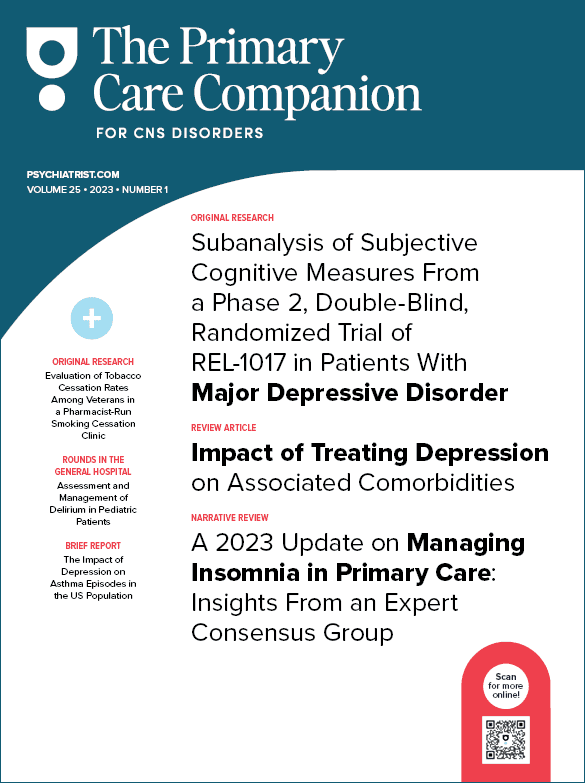Because this piece does not have an abstract, we have provided for your benefit the first 3 sentences of the full text.
Previous studies have reported that neuropsychiatric symptoms are associated with vitamin B12 deficiency. Disturbance of consciousness, delirium, and cognitive impairment are strongly suggestive of mental illness and organic brain disease. Therefore, clinicians may find vitamin B12 deficiency to be a diagnostic challenge, as illustrated in our case report.

A Case of Vitamin B12 Deficiency With Various Psychiatric Symptoms and Cognitive Impairment
Previous studies1-4 have reported that neuropsychiatric symptoms are associated with vitamin B12 deficiency. Disturbance of consciousness, delirium, and cognitive impairment are strongly suggestive of mental illness and organic brain disease. Therefore, clinicians may find vitamin B12 deficiency to be a diagnostic challenge, as illustrated in our case report.
Case Report
The patient was a married 57-year-old man with no history of mental illness. As his filial relationships were strained, he had self-managed his diet for the past 5 years, consuming only his favorite processed food bought at a convenience store with no consideration of nutritional balance. He took leave from work due to lower back pain 4 months before hospitalization.
Two months before hospitalization, he experienced numbness in his right hand and presented to the internal medicine department of hospital A, but no abnormalities were detected. About 17 days before hospitalization, he developed dysstasia, incontinence, and hallucinations. He presented to the psychiatric department of hospital B after 2 days of experiencing these symptoms and was diagnosed with depression. Since his physical symptoms persisted and psychiatric symptoms worsened, he was referred to the psychiatric outpatient department 12 days before hospitalization.
The patient’s symptoms of depression were unremarkable, but dysstasia, incontinence, and hallucinations such as "seeing the form of a middle-aged man" were still present. Results of blood analysis and head computed tomography scans were almost within normal limits. His behavior became progressively erratic. Thus, he was referred and admitted to psychiatric hospital C for examination of organic diseases and with a suspicion of acute and transient psychotic disorder. During this time, the patient developed severe abdominal pain and melena and was transported to the emergency department of a university hospital (9 days after admission to psychiatric hospital C).
Blood tests indicated anemia and renal dysfunction. Vitamin B1 and folic acid levels were within normal limits, but serum vitamin B12 levels were low at 190 pg/mL (reference range, 233-914 pg/mL). Atrophic gastritis (due to Helicobacter pylori infection) was detected on endoscopic examination and enteritis on abdominal computed tomography. The patient experienced auditory hallucinations and observational and persecutory delusions and was diagnosed with delirium. His Mini-Mental State Examination (MMSE)5 score was 9/30.
Although intramuscular injection of hydroxocobalamin is recommended by the British Society of Hematology Guidelines,6 we chose intravenous injection of methylcobalamin (1,000 µg) on alternate days for a week, along with the ongoing infusion, and then switched to oral administration (3,000 µg). On day 19 of hospitalization, his renal function, anemia, and delirium improved along with his general condition. However, his cognitive impairment persisted, with an MMSE score of 24/30 6 weeks after starting treatment. Therefore, he was referred and admitted to psychiatric hospital C on day 41 after admission to the university hospital to continue vitamin replacement therapy. He was discharged from psychiatric hospital C after 73 days of environmental control and rehabilitation. One year after discharge from psychiatric hospital C, his MMSE score was 30/30, he had no issues in his family life, and he planned to return to work. His vitamin B12 level was 1,096 pg/mL. He is currently taking methylcobalamin 3,000 μg.
Discussion
In our patient, the cause of the vitamin B12 deficiency was thought to be a combination of reduced dietary intake due to an imbalanced diet, malabsorption of vitamins due to atrophic gastritis, and enteritis. Vitamin B12 deficiency is reported to be common in older people,7 and the relationship between vitamin B12 deficiency and dementia has been reported.8 However, as there are several cases4,9 of patients presenting with a diverse range of psychiatric and neurologic symptoms during middle age, it is essential to proactively conduct tests to detect vitamin B12 deficiency when this condition is suspected based on the patient’s diet and atrophic gastritis. Report of improvement of cognitive impairment through long-term vitamin B12 supplementation therapy10 proves the importance of continuation of supplemental vitamin B12 therapy in patients with deficiency who show residual cognitive impairment, even after improvement of psychiatric symptoms.
Published online: February 20, 2020.
Potential conflicts of interest: Dr Kimoto has received research support from Otsuka, Shionogi, and Taisho. Dr Watanabe has received research support from Shionogi. Dr Mikami has received research support from Taisho, Otsuka, and Shionogi; honoraria from Otsuka, Shionogi, Shire Japan, Eli Lilly, and Meiji Holdings; and a consulting fee from Otsuka. Dr Matsumoto has received research support from Dainippon Sumitomo, Otsuka, Shionogi, Koike-ya, Mental Clinic Yokohama Minatomirai, Kishi Byoin, Soushu Hospital, Kouzu Hospital, and Tanzawa Hospital and honoraria from Eli Lilly, Novartis, Yoshitomiyakuhin, GlaxoSmithKline, Dainippon Sumitomo, Pfizer, Meiji Seika, Otsuka, Janssen, Eisai, Shionogi, Astellas, MSD, and Mitsubishi Tanabe. Dr Yamamoto has received grants from Eisai and Health and Labor Sciences, grants and personal fees from Otsuka, and personal fees from Meiji Seika, Sumitomo Dainippon, Pfizer Japan, Mitsubishi Tanabe, Teijin Pharma Limited, Eli Lilly, Yoshitomiyakuhin, Janssen Pharmaceutical KK, Merck Sharp & Dohme, GlaxoSmithKline KK, Daiichi Sankyo, and EPS Holdings. Drs Shibasaki, Tamura, Takahashi, and Maehara have no conflicts of interest related to the subject of this report.
Funding/support: None.
Patient consent: Consent was received from the patient to publish the case report, and information has been de-identified to protect anonymity.
REFERENCES
1.Andrרs E, Affenberger S, Vinzio S, et al. Food-cobalamin malabsorption in elderly patients: clinical manifestations and treatment. Am J Med. 2005;118(10):1154-1159. PubMed CrossRef
2.Moore E, Mander A, Ames D, et al. Cognitive impairment and vitamin B12: a review. Int Psychogeriatr. 2012;24(4):541-556. PubMed CrossRef
3.Blundo C, Marin D, Ricci M. Vitamin B12 deficiency associated with symptoms of frontotemporal dementia. Neurol Sci. 2011;32(1):101-105. PubMed CrossRef
4.Lerner V, Kanevsky M. Acute dementia with delirium due to vitamin B12 deficiency: a case report. Int J Psychiatry Med. 2002;32(2):215-220. PubMed CrossRef
5.Folstein MF, Folstein SE, McHugh PR. "Mini-mental state": a practical method for grading the cognitive state of patients for the clinician. J Psychiatr Res. 1975;12(3):189-198. PubMed CrossRef
6.Devalia V, Hamilton MS, Molloy AM; British Committee for Standards in Haematology. Guidelines for the diagnosis and treatment of cobalamin and folate disorders. Br J Haematol. 2014;166(4):496-513. PubMed CrossRef
7.Tal S, Shavit Y, Stern F, et al. Association between vitamin B12 levels and mortality in hospitalized older adults. J Am Geriatr Soc. 2010;58(3):523-526. PubMed CrossRef
8.Health Quality Ontario. Vitamin B12 and cognitive function: an evidence-based analysis. Ont Health Technol Assess Ser. 2013;13(23):1-45. PubMed
9.Lerner V, Kanevsky M. Acute dementia with delirium due to vitamin B12 deficiency: a case report. Int J Psychiatry Med. 2002;32(2):215-220. PubMed CrossRef
10.Ichino C, Sato T, Imamura T. Slowly progressive dementia due to vitamin B12 deficiency: cognitive characteristics and clinical course of recovery after replacement therapy. Japanese J Geriatric Psychiatry. 2017;28:1267-1274.
aDepartment of Psychiatry, Tokai University School of Medicine, Kanagawa, Japan
bDepartment of Psychiatry, Keyaki-no-Mori Hospital, Kanagawa, Japan
*Corresponding author: Kenji Yamamoto, MD, PhD, Department of Psychiatry, Tokai University School of Medicine, 143 Shimokasuya, Isehara, Kanagawa 259-1193, Japan ([email protected]).
Prim Care Companion CNS Disord 2020;22(1):19l02490
To cite: Kimoto K, Shibasaki B, Tamura N, et al. A case of vitamin B12 deficiency with various psychiatric symptoms and cognitive impairment. Prim Care Companion CNS Disord. 2020;22(1):19l02490.
To share: https://doi.org/10.4088/PCC.19l02490
© Copyright 2020 Physicians Postgraduate Press, Inc.
Enjoy free PDF downloads as part of your membership!
Save
Cite
Advertisement
GAM ID: sidebar-top




